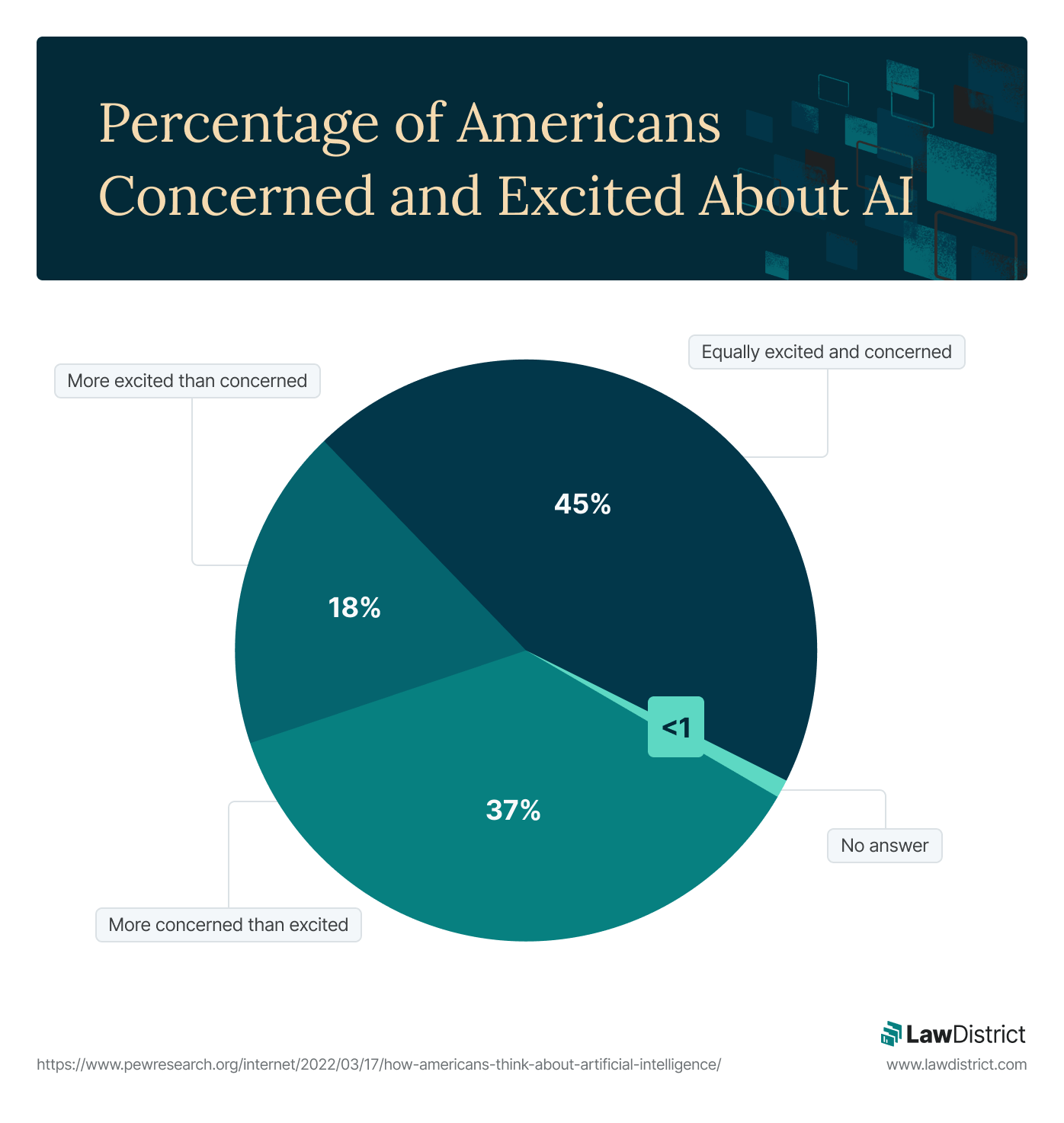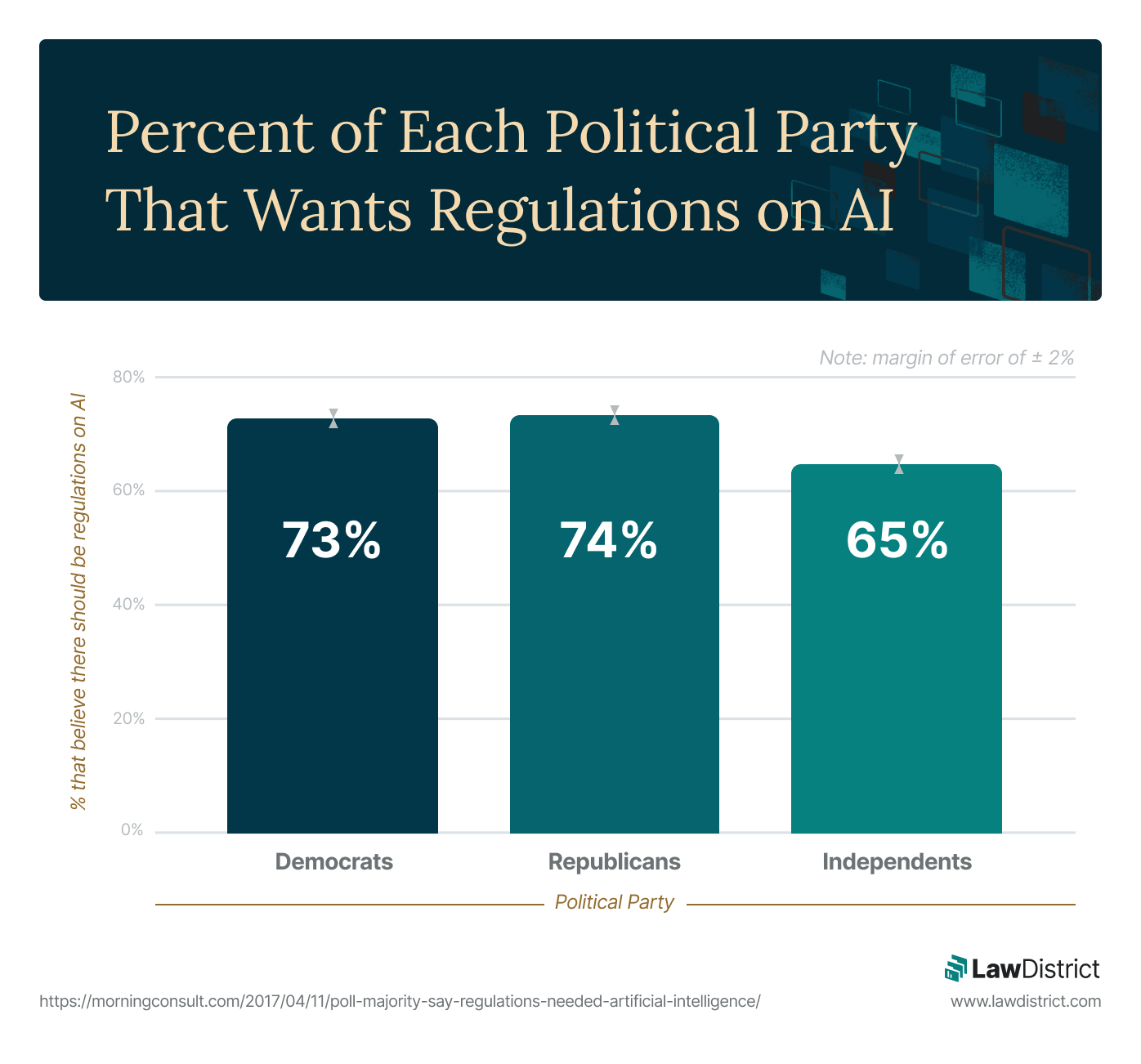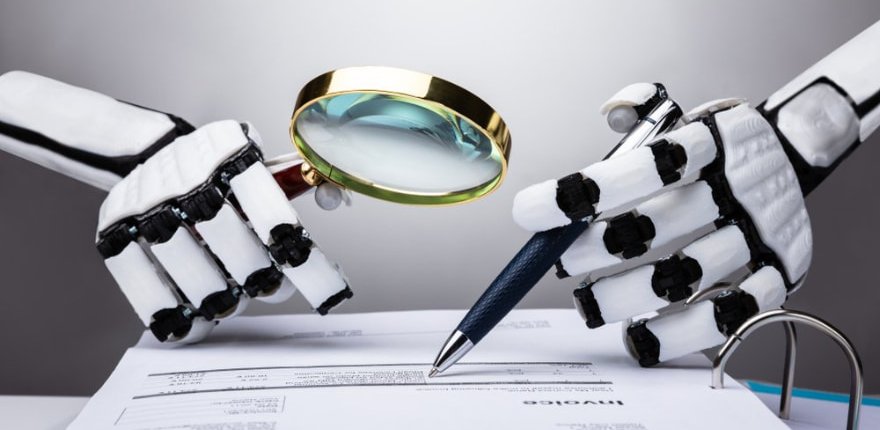Since the start of the new year, the use of artificial intelligence has been a hot topic. This is due to the growing popularity of chatbots such as ChatGPT.
In just about every field, professionals are wondering if chatbots and other AI technology can make their job easier. This applies to the area of law as well.
Experts and professionals have been asking, can AI help in the legal profession? Not only to draft essential documents such as contracts and templates. It’s even being mentioned as an alternative to an attorney during a trial.
Over recent years, different tools have been created or developed, such as:
- Contract drafting software
- Legal document revision software
- Smart contracts
- Case extraction software
- Legal strategy software
All the advancements in AI in recent years have led some parts of the American population to feel concerned. There are a number of Americans who feel comfortable with the idea of AI becoming more and more integrated into day-to-day life.
Many others do not share the same confidence in using AI for legal purposes and daily life.
It is essential to understand if using AI is a smart decision for both professionals and individuals who need legal help.
Keep reading to get information on how artificial intelligence is currently developing, the advantages and disadvantages of AI in law, and how Americans feel about these advancements.
What Is Contract AI?
Contract AI is when users use text-based machine learning and apply it to contract management, analysis, or extraction. It is also used to review legal documents and the data included in them.
Artificial intelligence will use algorithms to find data in contracts that may be placed incorrectly and then create structured information.
Legal AI is getting so advanced there was even a plan for a robot lawyer to represent a client in a speeding ticket case this year, which eventually did not happen.
While we’re still waiting for tools to be sophisticated enough to represent us in a trial, there is useful AI legal technology that is available.
Specifically, there are currently two purposes for contract AI:
- AI contract drafting
- AI contract review
As of now, various tools can draft legal forms. However, at this time, it’s still early in their development, and there are questions regarding how reliable they are.
How Does AI Write Legal Documents
Fully functioning and commonplace artificial intelligence for law firms seems more attainable than ever before.
Tools that write contracts, which are powered by AI are useful because they:
- Use pre-approved language to automatically substitute certain phrases
- Make amendment suggestions
This makes drafting templates much easier for legal professionals and even individuals without legal knowledge.
However, we have to ask, can AI write a form from scratch?
At this time, with a chatbot, writing a document can be done by providing a tool with a command to write the desired form and inputting information such as dollar amounts and contact information.
Are Contracts Made by Artificial Intelligence Reliable?
Using AI to create legal templates is still in its infancy. That’s not to say it's not helpful. However, apart from document review, there are still some areas in need of improvement.
According to After Your Time, there are major issues the AI presents when it comes to making a contract, such as:
- Unable to store the document
- Leaves out complex details
The article also mentions that it is a good idea for anyone who creates a form to review it with a lawyer.
AI for Law Firms vs. AI Legal Templates
At this point, many law firms will be fine with using artificial intelligence to revise and analyze their legal templates. However, drafting an entire template is a completely different story.
Look at the differences between the benefits AI provides for law firms in preparing for a case for example, and how it aids in template creation in the table below.
| Law firms
|
Template drafting
|
| Helps to review and optimize data and terms within legal documents.
|
Aids in the creation of a basic template that can be used repeatedly.
|
| Scan large legal databases to find key information.
|
Reviews existing contracts to lower the possibility of negative outcomes.
|
| Analyzes cases that have set precedents to help lawyers write accurate documents.
|
Avoids common causes of arguments in contracts.
|
As mentioned earlier, it is difficult for AI to include very specific or complex data in a document, so critical details are sometimes left out when drafting documents with artificial intelligence.
That is why using LawDistrict’s pre-approved legal templates, which allow you to add information specific to your circumstance, is still the safer option.
While using AI is clearly a time-saver, it doesn’t guarantee that it will create a completely legally valid document.
Our templates for documents, such as a Power of Attorney, for example, are created and reviewed by legal experts, making it possible to cater to each user’s specific legal needs and preferences.
Should Americans Be Concerned About AI?
While AI is becoming more utilized in our daily lives, getting everyone to feel confident about it will be a very difficult task.
That includes legal purposes as well.
According to a 2022 survey from the Pew Research Center, 37% of Americans are more concerned than excited about AI use, while 45% are both equally concerned and excited.
Only 18% of Americans are more optimistic than worried about AI use.

Another poll by Morning Consult done in 2017 mentions that 73% of Democrats and 74% of Republics would like U.S. regulations placed on artificial intelligence.

Gaining everyone’s trust has been an issue for some time. However, there are both pros and cons to using AI for legal document drafting. For some, the positives may far outweigh the negatives.
Advantages of Using AI for Legal Documents
When using AI to create or review a contract or form, there are some obvious advantages for both law firms and single users.
These positives include:
- Faster writing process
- Effective background checks
- Quick research, revision, and analysis
- Lower probability of human error
These advantages lead to less work and fewer mistakes. However, a faster writing process does not always mean a better outcome.
Dangers of Using AI for Legal Documents
AI presents certain negatives and dangers to both law firms and single users. Not only are there difficulties that can make using artificial intelligence difficult, but they can also lead to disastrous consequences.
Some dangers and negatives of using AI include:
- Cost
- Possibility of errors
- Stolen information
- Potential for lawsuits
Using AI platforms can be extremely expensive, especially when you are accounting for many users. The wrong input could be made, leading to disaster.
Arguably, the biggest risk comes from someone stealing a client’s personal information stored online. Some groups are even suing to protect their works from being included as inputs for AI.
As for lawyers, if they rely too much on an AI that provides false information, they can be fined. This is why all information generated in this way must be confirmed to be accurate.
The Best Way to Generate Legal Documents
Legal documents will always need revision due to the possible negative consequences that could happen if there are tiny errors or missing information.
At the moment, AI can help up to a certain extent.
However, it is still risky to depend completely on AI to write contracts and other documents for legal purposes.
Using approved templates of legal documents will avoid any unnecessary risk, as well as ensure that the form is created quickly.
As an individual in need of an agreement, contract, or application, downloading legal templates will help you cut down on costs and save time in the process.
Get Your Online Legal Documents and Contracts
Helpful Resources
How Americans think about AI - PewResearch
AI & Learning machines in legal sector - Forbes
AI will generated - After your time
Poll regulations on AI - Morning consult
AI tools for legal professionals - Analytics Indiamag
AI traffic court - Do not pay




